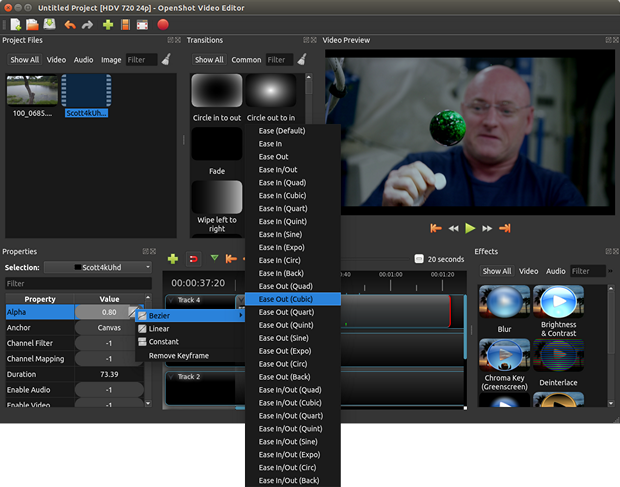 Versie 2.4.1 van OpenShot Video Editor is beschikbaar gekomen. OpenShot Video Editor is een opensourcevideo-editor voor Linux en is sinds versie 2.0 ook voor Windows en macOS beschikbaar. Het programma is gemaakt met Python, GTK en het MLT Framework, en is te vergelijken met Windows Movie Maker of Apples iMovie. Versie 2.4.1 bevat onder meer een verbeterde beeldkwaliteit, het programma werkt een stuk stabieler onder Windows en er zijn nieuwe videotutorials toegevoegd. Verder is de website nu beschikbaar in verschillende talen, waaronder in het Nederlands. De complete changelog is hieronder te vinden.
Versie 2.4.1 van OpenShot Video Editor is beschikbaar gekomen. OpenShot Video Editor is een opensourcevideo-editor voor Linux en is sinds versie 2.0 ook voor Windows en macOS beschikbaar. Het programma is gemaakt met Python, GTK en het MLT Framework, en is te vergelijken met Windows Movie Maker of Apples iMovie. Versie 2.4.1 bevat onder meer een verbeterde beeldkwaliteit, het programma werkt een stuk stabieler onder Windows en er zijn nieuwe videotutorials toegevoegd. Verder is de website nu beschikbaar in verschillende talen, waaronder in het Nederlands. De complete changelog is hieronder te vinden.
Improved Image Quality
We have improved the image processing pipeline in OpenShot to create sharper images, by switching our image scaling algorithm, and most importantly, only scaling a frame once, as opposed to multiple times (which used to happen in certain scenarios). This results in a noticeably sharper image, and slightly better performance.
Improved Playback Smoothness
The video preview capabilities in OpenShot have been improved to better handle higher framerate videos (50 fps, 60 fps, 120 fps). This results in a smoother playback experience, and less jittering and freezing with certain preview profiles.Improved Stability (especially for Windows)
Right after our previous release (in September 2017) we made some very large changes to libopenshot to better support Windows (with respect to certain data types in C++). This fixes many, many Windows issues, including audio files stopping early, sync/desync issues, videos stopping at 30 minutes (or at an earlier time), opening project files with non-English characters, and more. If you have had any issues on Windows, please give this new version a try.But is it really more stable?
Yes. Each release we fix actual stability issues, and continue to find race conditions, and add more protection around high risk code (such as image data). On certain systems, and with different combinations of video cards, CPUs, and OSes, some crashes happen often (which is less than ideal), and on other systems, it doesn’t crash at all. Each time we can reproduce a crash, we fix it, and the net result is statistically less crashes with each new version of OpenShot. We have reduced the # of crashes by a factor of 10 in the past 12 months, and will continue to work hard in this area.
New Video Tutorials
I am proud to announce a new series of video tutorials is in the works, and the first few are now available. I will be adding more videos very soon, and look forward to building a comprehensive collection of short (5 to 10 minutes) tutorials, covering all the features, secrets, and workflows built into OpenShot.
New Website Translations
As you might have heard me mention before, the OpenShot website is now available in different languages, and this has been really fun to work on. Bringing OpenShot to more languages and more people is exciting, so please check out the following translations, and help spread the word!Libopenshot (full list of changes)
- http://nl.openshot.org (Dutch)
- http://fr.openshot.org (French)
- http://fi.openshot.org (Finnish)
- http://is.openshot.org (Icelandic)
- http://nb.openshot.org (Norwegian Bokmal)
- http://tr.openshot.org (Turkish)
- http://uk.openshot.org (Ukrainian)
- Help us with your language
Openshot-qt (full list of changes)
- More critical sections trying to prevent race conditions on high CPU core systems
- Additional critical sections around adding frame images
- Codec lookup by name in FFmpegWriter, which should solve a few issues (such as xvid support). Thanks Peter!
- Fixing regression with rotation origin. Things should always rotate around the center of an object (until I add in keyframable anchor points)
- Setting timebase on video stream in FFmpegWriter... a bit experimental
- Improving playback smoothness on high framerate videos, especially when the video frames need to jump forward to keep up with the audio.
- Removing throw statements from header files
- Reducing # of scale operations to 1 per layer on the timeline
- Fixing 16 thread limit on FFmpegReader
- Fixing a cast from long to int64_t
- Updating all "long int" frame number types to int64_t, so all 3 OSes will produce the same depth and precision on frame numbers. This is a big one!
- Removing variable bitrate support (for now), since it causes more problems than it solves.
- Fixing small regression with translation website URLs when using default/en_US
- Fixing small bug in Export dialog where profile and quality get blown away when changing format
- Ignoring history update messages, since libopenshot doesn't care about them
- Simplifying export progress, reducing # of signals being emitted
- Integrating current language into website URLs and simplifying a few translations (removing HTML tags)
- Removing unneeded UTF8 encode method, which caused certain project paths to fail when loading (solves crash on Windows trying to open non-English project file paths)
- Fixing a big race condition on initial launch of OpenShot, which causes certain JavaScript calls to fail (so default profiles, snapping mode, and few other things set on launch would fail sometimes)
- Adding keyboard shortcuts for toggling 'Transform' and 'Insert Keyframe'. This improves the animation work-flow, and no longer requires a bunch of mouse clicks / context menus for animations.
- Preventing overwriting an input file with the export dialog, and updating export progress on export window title
- Updating translations and contributor credits


:fill(white):strip_exif()/i/2002218457.jpeg?f=thumbmedium)